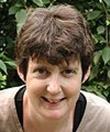
Tina Maschi, PhD, associate professor at the Graduate School of Social Service, studies both aging and criminal justice, and she found that a subsection of this graying prison population has long been overlooked: lesbian, gay, bisexual, and transgender elders.
To better understand the distinct experiences and needs of this population, Maschi conducted a qualitative study that allowed formerly incarcerated LGBT elders to tell their own stories. Through focus groups and one-on-one interviews with 10 volunteer participants, both male and female, Maschi gathered data from the narratives they told about their lives before, during, and after prison.
What she learned is that violence, often sexual violence, is a tragic fact of life for LGBT inmates, and that many times it is witnessed, overlooked, or perpetuated by both inmates and correctional officers.
“A lot of times, they couldn’t walk from place to place because of the fear of getting attacked, even going from their cell to an education class, or to go to the shower. So they are always on high alert,” Maschi said.
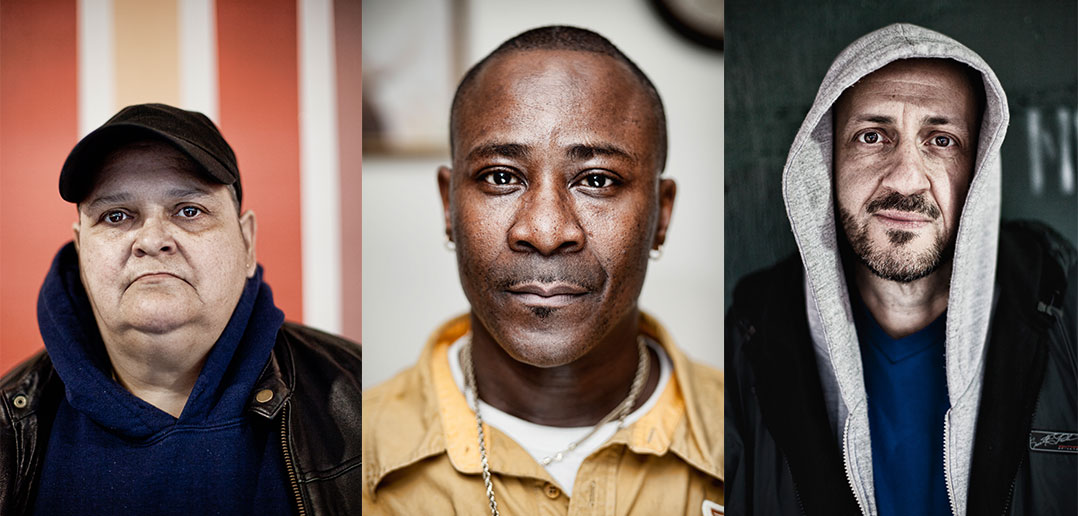
She also reported that sometimes LGBT inmates are put in solitary confinement, not due to their own behavior but for their own safety.
Troubles often continue for LGBT people returning to their communities after prison. Many face service providers who are not sensitive to their unique needs as well as difficulties finding housing where they feel safe revealing their sexual orientation.
Maschi found that a core theme of the participants’ stories was “self and the social mirror.” That is, the participants often managed multiple stigmatized identities, such as being LGBT, elderly, a racial or ethnic minority, being HIV positive, or having a mental illness or substance dependency.
At the same time, however, Maschi saw resilience in the participants that enabled them to continue a coming out process of “learning to accept themselves despite the fact that other people did not.”
“Despite everything that could knock them down, they stood tall and strong and sensitive,” she said.
For Maschi, factors that played a role in this self-acceptance were being accountable for the crimes they had committed, helping others, and finding social support.
Her study also drew upon the participants’ own recommendations for helping LGBT people in the criminal justice system. From these, Maschi concluded that a holistic approach was needed in providing vocational, educational, and clinical services to formerly incarcerated LGBT elders.
“We’re more than the sum of our parts,” she said.
Though an individual may be LGBT, elderly, a racial or ethnic minority, HIV positive, formerly incarcerated, “it’s just a piece of who they are,” she said.
“I think the common denominator is that we’re all human and we all deserve love.”
Maschi’s article on her study findings, “‘Coming Out’ of Prison: An Exploratory Study of LGBT Elders in the Criminal Justice System,” was published in May in the Journal of Homosexuality.
—Nina Heidig
]]>Days later, many people are still struggling to cope with news of the tragedy—even those who were not directly affected. That struggle is not uncommon, said two Fordham experts on stress and trauma; personal or geographic distance from the tragedy will not necessarily spare people from intense grief or even trauma.
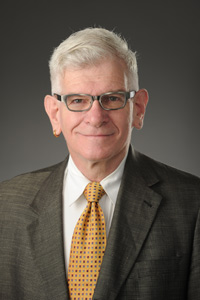
“Acts like this pull the rug out from underneath us,” said David Koch, PhD, clinical associate professor at the Graduate School of Social Service. “When something like this happens—losing 50 people at once in a violent act—you don’t have the traditional tools available, so how do you manage it?”
Few of us know what to do or how to act following such atrocities, because, until recent years, recurrent mass gun violence has not been part of our realities. In the aftermath of Newtown, Aurora, Orlando, and others, Koch said, we’ve come to realize we have no idea how to make sense of the fear, anxiety, anger, and sadness that these shootings have triggered.
Moreover, the near-constant stream of news coverage on media outlets and social platforms keeps us immersed in the unfolding tragedy. The exposure may trigger in some people a secondary grief reaction, said Mary Beth Werdel, PhD, an assistant professor of pastoral counseling at the Graduate School of Religion and Religious Education.
If that feeling of grief is accompanied by more intense physical and psychological symptoms—for instance, intrusive thoughts or memories about the event, hypervigilance, feelings of anger or sadness, or sleep or appetite disturbances—then one may also be experiencing a trauma reaction.
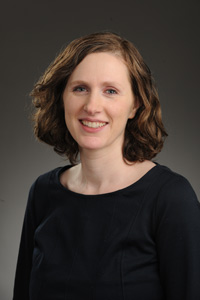
“When there is a mass shooting or terror attack, one may be a survivor, may have witnessed the attack live, or may be witnessing it through repeated media exposure,” Werdel said. “It is possible to have trauma reactions as a result of any of these experiences. The impact is dependent upon a number of factors, including previous trauma and loss experiences.”
In cases of traumatic grief, it is often necessary for people to seek a licensed social worker, counselor, or psychologist who specializes in trauma, Werdel said.
“Trauma… shatter[s]a person’s assumption of safety and may result in experiences of vulnerability and fear,” she said. “The work of the individual, then, is to rebuild.”
Koch, who specializes in the mental health of lesbian, gay, bisexual, and transgender individuals, said in the days following the Orlando shooting, that sense of “shattered safety” has been felt widely among members of the LGBT community.
The question, then, is how do we cope?
“You first have to acknowledge that your typical ways of coping have gone out the window and you have to figure out new ways in the face of this much trauma—cognitively, intellectually, and emotionally,” Koch said.
“I cope by trying to be in touch with what I’m feeling and to use ways of coping that have worked before to help manage feelings. I slow down, do some meditation, take my foot off the accelerator a bit and try not to get too agitated.”
Most important, he said, is to use social supports.
“In the face of this kind of hate, we need to reach out to and take care of one another—to provide those social networks… so that we’re not alone,” he said. “That collective action can serve as a kind of buffer against the hate… It also helps combat feelings of helplessness.”
In time, it is possible for people to move through and even grow as a result of tragedy, said Werdel, who researches post-traumatic and stress-related growth. There are several factors associated with experiencing this type of growth, she said, including personality traits of optimism and openness, social support, positive religious coping styles and faith maturity.
Growth, however, takes time.
“When we consider post-traumatic growth or stress-related growth, we must remember the importance of pace. By this I mean that we don’t look for growth experiences too quickly,” Werdel said.
“The image of ‘growing strong in our broken places’ that Hemingway wrote of is often considered when thinking of post-traumatic growth—it takes time. It is not immediate. We must also remember that growth is not in place of stress or trauma reactions but rather often coexists.”
(Stay up-to-date on campus happenings. Sign up for our e-weekly Fordham News.)
]]>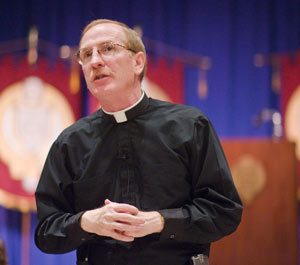 Dear Members of the Fordham Family,
Dear Members of the Fordham Family,
The vicious and senseless shooting in Orlando on Sunday morning stunned and saddened the entire country, and indeed the whole world. Although terror attacks and incidents of mass murder have sadly become all too common in the course of the past two decades, Sunday’s incident was particularly unnerving and frightening because it targeted the LGBT community. In the aftermath of the incident, which left 50 dead and scores injured, the world community has united both in condemning the attack and in expressing support for the LGBT and Latino communities–both in Florida and around the country.
As a Jesuit university (and hence a university whose entire life and mission is inspired by the Gospel and its challenge to live in love), Fordham joins people of good will around the world in condemning the Orlando attack. In addition, however (and precisely because of our Jesuit identity), the University offers its heartfelt support to the LGBT and Latino communities both on campus and throughout the country. It also offers its equally heartfelt prayers to the families and friends of those who died so senselessly on Sunday morning.
To honor those who died on Sunday, all of the Masses celebrated in the University Church and in the various chapels on our campuses this coming Sunday will be said for the repose of their souls and the comfort of their families. In addition, the University will hold prayer services in the Rupert Mayer Chapel on the Lincoln Center Campus and in the University Church on the Rose Hill Campus at Noon on Monday for those who will not be able to join us for Mass on Sunday.
This is a time for the whole Fordham family to come together, to pray for healing, and to stand in solidarity with people of good will everywhere.
Sincerely,
Joseph M. McShane, SJ
]]>The exhibit represents the culmination of a productive post-doctorate project by Fordham’s Asato Ikeda, PhD, assistant professor of art history, also the exhibit’s curator.
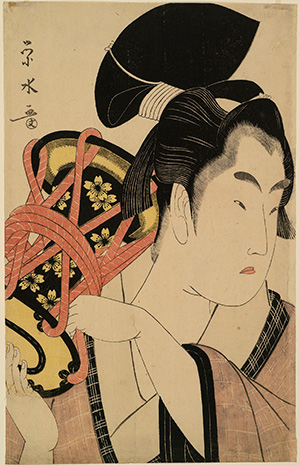
(Courtesy ROM collection)
Ikeda culled “A Third Gender: Beautiful Youths in Japanese Prints” from more than 2,500 Japanese woodblock prints in the museum’s collection, the largest of its kind in Canada. The images depict adolescent males in Edo-period Japan, who have yet to go through the traditional coming of age ceremony but who were considered sexually active and attractive by the society.
“In the exhibition we’re developing a new definition of gender,” said Ikeda. “It’s not just determined by biological sex, but also age, role in sexual hierarchy, and appearance.”
By focusing on the topic of gender and sexuality, the exhibit provides relevance to contemporary audiences grappling with the issue, said Ikeda.
Most of the prints are from the Edward Walker Collection, which was given to the museum in 1926, but were largely underexplored. With Ikeda’s expertise in Japanese art, the museum was able to begin an overall assessment, while simultaneously curating a show.
“There were boxes that nobody had opened for years,” she said. “It was very challenging because not much was on the museum database, so we had to record all of the information.”

(Courtesy ROM collection)
The museum kept a blog of the process, but outside of the database and blog very little of the collection has been seen online. Digitizing would be a costly 5-to-10-year process, said Ikeda. As such, the exhibition represents a rare opportunity not only to examine the wakashu, but also an opportunity to view significant pieces from the collection.
“The museum collection is so comprehensive that we were able to choose such a specific theme,” she said.
Ikeda collaborated on the project with Joshua S. Mostow, PhD, an expert in the gender structure of Japan’s Edo Period, which lasted from the 17th to the 19th centuries.
In the process, the curators consulted with the Canada’s LGBT community, social workers, and activists through workshops. The concept was very well received with great interest in the historical aspect of gender issues and appreciation that an established museum would explore the subject in in such depth, said Ikeda.
“We try to be clear that the wakashu are not identical to LGBT culture today,” said Ikeda. “But certainly its culture is very important in terms of thinking about diverse gender and sexuality practices.”
“For example, the word ‘gay’ is very specific to our contemporary culture. It’s very democratic, egalitarian, and individualistic, and you have claim to your identity. In 17th-century Japan, however, you couldn’t really claim your identity. It was imposed on you by age, gender, and class.”
A section of the exhibition is dedicated to contemporary identity issues, but some of it is also devoted to different gender and sexual norms and ideals—from the pederasty of ancient Greece to 19th-century binary gender norms in Victorian England to the “two spirited people” of the first nations.
Traditional Form, Edo to the 20th Century
Ikeda’s own area of research and expertise centers on fascist paintings celebrated by the Japanese government and authorities during World War II. “The desire was to return to quote-unquote ‘traditional,’” said Ikeda, “The fascist paintings don’t look violent and don’t show soldiers, but those peaceful looking paintings were meant to evoke pride in Japanese traditions and justify the war against the West.”
When Ikeda was young, stories her grandfather told her sparked an interest in the fascist art. He was from southern Japan, where the kamikaze planes lifted off.
“My grandfather was obsessed with kamikaze and he was ultranationalist,” said Ikeda.
She noted that only since the turn of the century did scholars begin to look at Japanese wartime art. The dominance of the Japanese right-wing in politics, which resulted from the strong U.S.-Japan alliance since the Cold War, prohibits the kind of self-examination engaged in by German people after World War II, she said.
“Japan has trouble understanding this part of history,” she said. “In Germany you can’t deny the holocaust and the Germans collectively tried to be apologetic, but that’s not the case for Japan, where people can publicly claim that the Nanking massacre never happened. There is no consensus. Basic historical facts continue to be contested and dismissed.”
As she worked on her soon-to-be-published book, Soldiers and Cherry Blossoms: Japanese Art, Fascism, and World War II, she discovered that some relatives of wartime artists remained resistant to allowing her to publish the material.
In both the case of the wakashu and the case of the fascist art, Ikeda is taking an unflinching look at history; however, she refuses to make a judgment call on whether the art is good or bad. That, she said, is not an art historian’s job. Instead, her job is to situate artworks in historical context.
“The art is not just important historically, it’s very important politically and ethically,” she said.
]]>Whoever has one has completed a Fordham University workshop on creating an accepting environment for lesbian, gay, bisexual, and transgender (LGBT) students. Now in its seventh year, the workshop program received a new national award this week for its efforts to educate people from across the University community—students, faculty, staff—about the many ways in which they can make LGBT students feel at home.
The program is the LGBT and Ally Network of Support, and LGBT students at Fordham are taking notice as more people complete its training, according to the administrator who oversees it.
“Seeing that rainbow certificate gives them an open door to be more comfortable if they do identify as LGBT, and that’s what we’ve been seeing sort of percolate through the Fordham community,” said Assistant Dean Juan Carlos Matos, director of the Office of Multicultural Affairs, which runs the program.
On March 15, the program was honored at the annual conference of NASPA, the membership organization for student affairs administrators in higher education. Fordham’s program received the Exemplary Program Award from the NASPA GLBT Knowledge Community, one of many NASPA communities devoted to various aspects of student affairs.
Institutions are putting more effort into being welcoming to all students, including LGBT students, said Kimmi Cantrell, the knowledge community’s awards coordinator.
“As professionals, we have to ensure that we’re prepared to provide (LGBT students) the resources that they need,” she said. “There are a lot of different students who come from these communities and don’t have support from their family or their friends or whatever the case may be.”
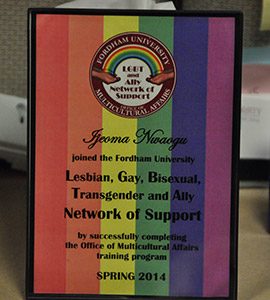
Fordham’s LGBT and Ally Network of Support holds workshops twice a year at both the Rose Hill and Lincoln Center campuses, with an estimated 100 to 120 people completing the workshop per year, Matos said.
The program is framed in terms of the Fordham mission of cura personalis—or care of the whole person—and the Catholic principle of treating all persons with dignity and respect. The workshops’ diverse speakers include a member of the Society of Jesus and the dean of students from the Rose Hill and Lincoln Center campuses. Members of the counseling and psychological services staff talk about listening skills and other topics, and a student discusses his or her “coming out” process.
Topics include gender-neutral pronouns, identity models, and campus resources to help LGBT students. Through exercises, participants learn to imagine the possible experiences of LGBT students, like being marginalized or being rejected by family members because of one’s sexual orientation.
“One of the most valuable things that comes out of the training would have to be empathy,” said Ijeoma Nwaogu, PhD, assistant director of the Office of Multicultural Affairs. Through some of the activities, she said, “we’re saying, ‘This is what LGBT individuals face, and how would it feel if you were in that situation?’”
“I think everyone needs to participate” in the workshop, she said. “I think everyone needs an opportunity to begin that process of unlearning a lot of the stereotypes and assumptions that we have about LGBT folk, and Fordham provides a space through this training opportunity.”
This type of program doesn’t usually bring together students, faculty and administrators, as Fordham’s does, Matos said. “I do feel there is some safety in that,” he said. “I think there are very few spaces that exist where you can have all those individuals together to talk about this one topic.”
The mere existence of the program eases students’ worries, he said: “On multiple occasions, there have been folks that share with us, ‘I’m not able to come to the training, but I’m so appreciative that this even exists.’”
]]>
The report, which SAMHSA released today, concludes that, in fact, such therapy can be “devastatingly harmful” to those who undergo its treatment.
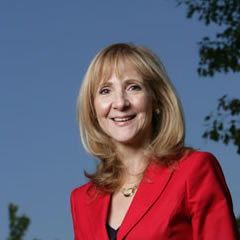
SAMHSA and the American Psychological Association (APA) convened a panel of advisers in July to examine the scientific and clinical data behind conversion, or reparative, therapy—a treatment that aims to change an individual’s sexual orientation or gender identity.
The ensuing report, “Ending Conversion Therapy: Supporting and Affirming LGBTQ Youth,” found that the therapy is based on pseudoscience and did not meet the professional and ethical standards of the mental health professions. At best, these therapies are ineffective, and at worst, they can be profoundly detrimental, said Fisher.
“These therapies can involve very harmful treatments such as shock therapy—that is, showing an individual [photos of]a particular gender and shocking the individual so as to prevent a sexual response,” said Fisher, the Marie Ward Doty Endowed Chair and a professor of psychology.
“It can also involve berating and focusing on the immorality of the sexual orientation or gender identity. Basically, it’s a punitive form of treatment that has no scientific or clinical basis.”
Experts were called upon to examine the controversial therapy following the suicide of transgender teenager Leelah Alcorn, 17, whose parents forced her to participate in conversion therapy. The public outcry following her death led to the drafting of Leelah’s Law, which would ban the therapy.
SAMHSA’s report is an important step in the White House’s commitment to expanding the number of states who enact the law, said Fisher. Some studies estimate as many as one-third of children and adolescents who identify as a sexual or gender minority has undergone some kind of conversion therapy.
“Children, youth, and even young adults can experience post-traumatic stress disorder as a result, because it’s so stressful to be under these punitive and harsh conditions. It can also lead to depression or can increase a sense of dysphoria and further alienate individuals from their families,” Fisher said. “And, as in Leelah’s case, it can result in suicide.”
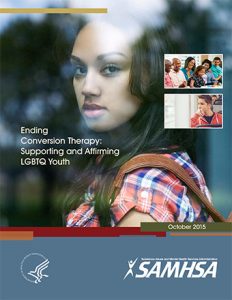 The report indicates that variations in gender identity and sexual orientation are normal in children. However, because of the prejudice and stigma they face, LGBT youth are particularly vulnerable to depression, anxiety, and other mental illnesses.
The report indicates that variations in gender identity and sexual orientation are normal in children. However, because of the prejudice and stigma they face, LGBT youth are particularly vulnerable to depression, anxiety, and other mental illnesses.
“But it’s not because of these children’s identity [as LGBT individuals]—it’s because of the way they’re treated by their families, their schools, and society,” Fisher said. “These are the conditions… that any disenfranchised and marginalized group may experience.”
The way to support sexual and gender minority youth, she said, is to affirm and accept each individual and to support his or her need for self-expression. The idea is not to push young people in one direction or another, but rather to give them space to explore.
Moreover, mental health professionals, physicians, school personnel, and others who work with children and adolescents need additional training in LGBT issues to better understand the needs of these populations, Fisher said.
“The issues included in this report are intended to enhance the lives and well-being of sexual and gender minority youth by helping to ensure they receive informed, evidence-based, and bias-free services. The systematic elimination of conversion type therapies is critical to the goal of reducing the health disparities facing this vulnerable population.”
Read more on the Ethics and Society blog.
]]>The murder of Mark Carson, who was shot and killed in Greenwich Village in an anti-gay hate crime, brought a message to New York City: although we have come far in ensuring the rights of the LGBTQ community, we have not come nearly far enough.
With the aim of promoting social justice and a culture of tolerance, Fordham’s Be The Evidence Project (BTEP) will host a presentation and follow-up dialogue on the current standing and future of LGBTQ rights.
“What a Tipping Point Looks Like: LGBTQ Rights and Future”
Tuesday, June 18
12:30 p.m.
South Lounge | Lowenstein Center | Lincoln Center Campus
113 West 60th Street | New York, NY 10023
“Everyone individual is entitled to be treated with dignity and respect, and within that is equality. But there are certain populations that do not have equality, and that is the LGBTQ population,” said Tina Maschi, Ph.D., assistant professor at theGraduate School of Social Service and founder and director of BTEP.
“If you have to negotiate your identity by not disclosing it, then you are passing for the majority, but you’re compromising who you are and your right to be who you are.”

The presentation will feature Kate Kendell, executive director of the National Center for Lesbian Rights, a national legal organization committed to advancing the legal and human rights of lesbian, gay, bisexual, and transgender people and their families.
Maschi said she hopes that by featuring a national advocate for LGBTQ rights, the forum will generate public support to make visible a population that often suffers invisibly.
“We can have laws on the books, but unless there’s a spirit of tolerance in the population, then we won’t see change,” she said. “Policies are necessary, but they’re not sufficient. They need to be supported by the community. So I’m hoping that people who attend the event will become empowered to speak out and to become allies, and to realize that if everyone doesn’t have rights, then it affects us all.”
Tuesday’s event is the spring installment of BTEP’s Town Hall Speaker Series, which aims to focus on issues that impact the local as well as global community.
The event is free and open to the public and includes lunch.
Fore more information, email BTEP.
]]>May 2012
The president, the Board of Trustees, the faculty and the administration of Fordham University condemn discrimination and hate speech regardless of the source and intended victim or victims.
One challenge we face is that the entire student population turns over every four to six years, roughly, requiring that anti-bias education and programming be an ongoing effort, which is a priority for Fordham.
A Jesuit education attracts students, faculty, and staff who value diversity and who are cosmopolitan in their attitudes toward race, gender, sexual identity, and disabilities, but because of the constantly changing population, and the geographical range of recruitment, there will always be members of the community who take some time to learn and adopt the Jesuit ethic.
Outlined below, in three sections, are the University’s standing practices on diversity, its recent efforts in response to the bias incidents this spring, and proposed changes and improvements to our practices and programs.
Admissions Diversity
The University and its Office of Undergraduate Admission make significant efforts to recruit and retain students of color and diversity, including scholarships and fee waivers.
At both the Fall and Spring preview events the Office of Undergraduate Admission hosts a multicultural reception with the help of the Office of Multicultural Affairs. Each year the office forms a multicultural recruitment team of student volunteers to assist with recruitment and outreach to students of color.
Fordham has hosted the regional Latino College Fair for the last four years, in conjunction with the Commission on Independent Colleges and Universities (CICU). The daylong program brings more than 900 students from underrepresented populations to campus and provides education and resources on all aspects of the college enrollment and completion process.
Fordham continues to increase its Presidential Scholarships—Fordham’s highest level of scholarship, which includes full tuition and housing—to students, with special attention given to underrepresented students. The University also increased the number of National Achievement and National Hispanic Scholarships and Deans Awards to underrepresented students.
A large majority of Undergraduate Admission’s recruitment and outreach efforts to underrepresented students of color is conducted through the group tour program. Since the Summer of 2011, Fordham has hosted 92 different groups on campus and provided tours and information sessions to more than 3307 students.
Undergraduate Admission also works closely with the Collegiate Science and Technology Entry Program (CSTEP), the Office of Multicultural Affairs, and the Dorothy Day Center for Service and Justice, on recruiting underrepresented students of color. In addition, Undergraduate Admission works annually with many local and national organizations, the mission of which is to help under-represented students gain access to higher education.
Current University Anti-Bias Efforts
The Office of Multicultural Affairs (OMA) has historically offered a wide range of programs to increase dialogue and educate the University community on issues of race, gender, and sexual identity.
The Sustained Dialogue Series is a monthly gathering of community members to engage in thoughtful and authentic exchange on a variety of topics that provides the space for reflection and the enhancement of self-awareness, knowledge, critical thinking and communication skills.
The Deeper Dialogues Program is a more intimate dialogue program open to only ten student participants per section, focused on a variety of diversity topics, including affirmative action, colorism, education achievement gap, gender, spirituality, identity and whiteness.
The Diversity Peer Leader Program is a leadership opportunity for students designed to enhance and increase their knowledge and awareness on diversity and social justice and train them to engage the Fordham community in dialogue around a variety of topics intended to encourage intercultural communication and exchange.
The Lesbian Gay Bisexual Transgender (LGBT) & Ally Network of Support is a trained network of University community members committed to creating a campus environment that is open and welcoming to LGBT students and their allies, in keeping with the Jesuit tenet of cura personalis and the explicit Catholic teaching that all persons should be treated with dignity and respect.
The Multicultural Action Council holds monthly meetings with student leaders from Fordham’s cultural and social justice focused clubs and organizations to foster community building and collaboration.
Through Student Leader and Staff Diversity Training, OMA collaborates with various Student Affairs departments to develop programs and training sessions for student leaders and staff, designed to enhance learning opportunities, cross-cultural communication and increase multicultural competence.
The OMA Newsletter, published twice each semester, highlights multicultural events on campus and raises awareness about a wide variety of cultures and traditions.
Complementing OMA activities is a range of other Student Affairs initiatives and procedures that constantly evolve to incorporate best practices and address current concerns.
Training for new resident assistants includes an address from the dean of students on bias response standard assertiveness expectations. The Office of Multicultural Affairs and resident directors give standard diversity and multicultural affairs training for new and returning resident assistants each fall. Refresher training sessions in January, conducted by resident directors, help prepare resident assistants for sensitive conversations on race, religion and sexual identity. Student Affairs also conducts year-round, in-service training programs on diversity.
Resident directors receive diversity and inclusion training and “train the trainers” sessions to prepare for resident assistant training. The resident directors also receive “train the trainers” refreshers training with outside facilitators on preparing resident assistants to handle sensitive conversations on race, religion, and sexual identity.
Student Affairs holds new student orientation at both campuses. “Real World Fordham” dramatizes sensitive student experiences related to diversity and inclusion and orientation leaders are trained to lead small group discussions. Nationally-recognized diversity speaker Mohammed Bilal presents “12 Steps Towards Appreciating Diversity” for all new students and the Office of Safety and Security holds sessions for students and parents, including instructions on how to get help and report incidents.
Orientation leaders participate in standard diversity and inclusion training by the Office of Multicultural Affairs and an LGBT and Ally reception is held during new student orientation, hosted by the Fordham Pride Alliance and the Office of the Dean of Students. Fordham also offers a diversity module in the First Year Formation course.
Freshman core programming offers extended Office of Safety and Security sessions, including instructions on how to get help and report incidents, for all new resident and commuter students. Annual floor meetings are held in each residence hall in the fall semester, including detailed information on reporting incidents.
Annually, the University holds a Fordham Advocates Cultural Enrichment (FACE) Series, a weeklong series of programs that focus on diversity and multiculturalism, at the Lincoln Center campus.
The Counseling Center hosts a support group for students of color interested in discussing and exploring their experiences as racial and ethnic minorities on campus and in their communities, and the Spectrum/LGBT support group for students interested in exploring issues around sexual identity.
The Department of Safety and Security aggressively investigates all incidents, including suspected bias incidents and hate crimes. The usual protocol in any incident is for Security to immediately begin an investigation, which includes interviewing potential witnesses, examining the physical evidence, and employing various other resources within the University. Security administrators work closely with the local police precinct, and with the NYPD’s Hate Crimes Task Force as appropriate.
In cases of vandalism, bias-related or otherwise, Custodial and Facilities Services respond immediately to remove the offensive material and repair or restore the vandalized areas after evidence has been preserved.
Security notifies the University community via e-mail alerts of any violent crimes committed on or near campus, as required by a Federal law known as the Jeanne Clery Act.
Recent Anti-Bias Efforts
In response to several incidents of bias-related vandalism in February and March 2012, Student Affairs, student groups and student government, the Office of University Mission and Ministry, academic departments, and the Office of the President, sponsored a variety of events and initiatives at the Rose Hill and Lincoln Center campuses.
In February and March 2012, the Office of Student Affairs staff presided over six town hall meetings in Walsh Hall, McMahon Hall, Goupil Hall, and Martyrs’ Court, to discuss the incidents.
Also during February and March 2012, the president and vice presidents met to discuss the University’s response to the incidents, and the Office of Student Affairs conducted 26 separate residence hall response programs among all the residence halls at both campuses in response to the bias incidents.
The Student Life Council at Rose Hill met twice in February and March 2012 to discuss the bias incidents, as did its executive board. The Student Life Council meetings were open to the entire student body, and included student leaders, the dean of students and the Office of Student Affairs department heads.
In February 2012, the Office of Multicultural Affairs held a Sustained Dialogue on “post-racial society” and met with students to discuss their feelings and concerns about the recent incidents.
Student Affairs held resident assistant in-service training at the end of February and in the first week of April which included refresher training sessions to prepare resident assistants for sensitive conversations on race, religion and sexual identity.
United Student Government held a Rally for Solidarity at Lincoln Center, and a Healing Vigil at Rose Hill in March.
The Office of University Mission and Ministry held “Call to Unity” Vigils at the Rose Hill and Lincoln Center campuses in March.
The Fordham Center for Ethics Education held “Faculty Voices Against Hate Speech” in March 2012 which Student Affairs staff supported and advertised.
Student Affairs sponsored two public events with TJ Leyden, an anti-racism speaker, at Rose Hill and Lincoln Center in April 2012.
The student-led group Activating Consciousness Together (ACT) met with Rose Hill Student Affairs department heads, the dean of students, and the OMA assistant dean in March 2012. United Student Government facilitated an “Activating Consciousness Together” gathering to lend support to community response efforts. The Student Affairs department heads, the dean of students, and the OMA assistant dean participated in seven separate subcommittees with students, student leaders, faculty, and staff to gather ideas and plan future initiatives. These subcommittees are ongoing, and will continue to meet informally during the summer, 2012. They will resume formal meetings on September 12, 2012.
In response to the incidents of bias-related vandalism in February and March 2012, the senior vice president for student affairs issued University-wide statements in each case. The president issued two University-wide statements in March and April 2012, and held a meeting with the student press.
The president also met privately with several small groups of students, and attended several public meetings at which he listened to students’ concerns and took questions.
The University adhered to its standard procedure following these incidents, with Security beginning immediate investigations, speaking with officials from the local precinct, and working with NYPD’s Hate Crimes Task Force. Those investigations are ongoing. Residential life and office for multicultural affairs staff provided support to affected students and the community while the investigation proceeded.
Likewise in each case, the offensive material was photographed for evidence and removed.
Forthcoming Diversity/Anti-Bias Initiatives
In March, the University opened a search for a director of institutional equity and compliance. The director, an expanded position, will continue to update policies and procedures on preventing discrimination and enforcing nondiscrimination policies; develop educational materials in print and electronic media appropriate to the University community; develop and implement regular training programs on discrimination issues, policies, and procedures, and monitor the effectiveness of those programs across the University; and, investigate discrimination complaints involving employees and pursue informal or formal remedies, as appropriate.
Student Affairs has been pursuing several initiatives in conversation with student leaders and other members of the University community as part of the student-led Activating Consciousness Together (ACT) group. ACT’s goal is to organize a working coalition of students, faculty members, administrators, and staff committed to developing systemic and enduring University practices that promote standards of dignity, respect, and understanding.
Working with ACT, the University will have new or enhanced initiatives in place in several areas no later than the start of the fall semester. Among the ACT initiatives are:
- A review of University protocols and procedures regarding response to incidents;
- Confidential online reporting of non-emergency incidents by members of the University community;
- The creation of a bias response team to develop and spearhead programming and community education in response to future incidents;
- Development of curricular suggestions for presentation to the appropriate faculty bodies;
- Workshops for administrators and staff;
- Greater outreach (by ACT and the University) to commuter and graduate students on issues of diversity;
- Availability of anti-bias materials (including event information) at faculty orientation.
Other efforts include the continuation and expansion of ongoing programs, including assessment, renewal and continuous improvement of relevant topics in training for undergraduate student and administrative staff; improvement of relevant topics in new student orientation, First Year Formation, and Core Programming; and greater community-wide education and awareness via speakers, publicity campaigns, and community building, and through educational programs on relevant topics.
The Office of University Mission and Ministry will be using the entire 2012-2013 academic year as an opportunity to engage in an exercise intended to stir a broader awareness of the University’s formal mission and a deeper commitment to its relevancy, vibrancy, and renewal.
Given the painful bias incidents of this past semester, University Mission and Ministry plans to enhance as many of next year’s existing programs, events, and initiatives as possible with mission-related practices. University Mission and Ministry will be offering a new creativity and energy to all liturgical and service programs, underscoring the need for every member of the community to act ever more intentionally and compassionately with enlightened consciences that inform their daily decisions and interactions.
These yearlong efforts will be primarily, but not exclusively, coordinated through the offices of Campus Ministry, the Dorothy Day Center for Service and Justice, and Global Outreach. To mark the start of the year ahead, University Mission and Ministry will be releasing a new Fordham Prayer Book intended to aid people of all faiths and no faith at all to be ever more reflective in the ongoing discernment of their life’s journey.
]]>On Oct. 21, the Fordham community took back the night.
About 65 students, alumni and faculty members, as well as several speakers and other supporters, gathered in the wind on Robert Moses Plaza for the third annual “Take Back the Night” event at Fordham. The vigil and forum gives voice to the survivors of sexual, domestic, and LGBTQ-related violence.
The event was sponsored by Isis, a student organization at the Lincoln Center campus that facilitates discussions on feminist aspects of the political, intellectual and cultural climates of the world.
Students shared stories about their experiences and stories about family members and friends who were victims of violence. In addition, several students performed music focused on the themes of love, compassion, support and putting an end to hate.
Fordham faculty in attendance included Keith Eldredge, dean of students at the Lincoln Center campus; Vincent DeCola, S.J.; Sofia Bautista Pertuz, assistant dean and director of the Office of Multicultural Affairs; and Margaret Schwartz, Ph.D., assistant professor of communication and media studies and the Isis faculty adviser.
Ten speakers from outside the Fordham community joined in the discussion about violence. They shared their experiences of living through violence and working with organizations that try to curb violence.
The vigil ended with a student reading Maya Angelou’s poem, “Still I Rise.”
Following the forum was a debriefing session facilitated by psychologists from Counseling and Psychological Services at the Lincoln Center campus. Topics of discussion included gender violence and not blaming the victim.
—Jenny Hirsch